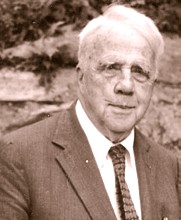
"A poem begins with a lump in the throat; a home-sickness or a love-sickness. It is a reaching-out toward expression; an effort to find fulfillment. A complete poem is one where an emotion has found its thought and the thought has found the words."
Robert Frost
|
Robert Frost is probably the best known and most loved poet of the past century.
Born in San Francisco in 1874, and after graduating from high school, Frost attended college for a while, and earned a living by working various trades. He was a shoemaker, a country schoolteacher, the editor of a rural newspaper, and a farmer. He also wrote poetry, but had little success in getting his poems published.
In 1912, at the age of 38, Frost moved to England, where with the assistance of several poets he met there, was able to publish his first two volumes of poetry. These won him immediate recognition, and when Frost returned to the United States in 1915, he found that he had become well-known.
He continued to write poetry while living on farms in Vermont and New Hampshire, and teaching at various colleges, including Dartmouth College and Harvard University. Robert Frost was awarded the Pulitzer Prize for poetry four times, and in 1961 he became the first poet to read a poem at a Presidential Inauguration, that of John F. Kennedy
 Frost's poetry is largely based on his experiences with the life and scenery of rural New England. But despite his rural origins, his poetry was highly structured, with traditional metre and rhyme schemes; Frost disliked free verse. (He once said he would as soon play tennis without a net as write free verse). And while his subject matter was seemingly very ordinary, Frost's emotional range in his poems is very broad, ranging from touching humour to tragedy. Much of his poetry deals with the interaction between people and nature; Frost regarded nature as beautiful but sometimes perilous. Frost's poetry is largely based on his experiences with the life and scenery of rural New England. But despite his rural origins, his poetry was highly structured, with traditional metre and rhyme schemes; Frost disliked free verse. (He once said he would as soon play tennis without a net as write free verse). And while his subject matter was seemingly very ordinary, Frost's emotional range in his poems is very broad, ranging from touching humour to tragedy. Much of his poetry deals with the interaction between people and nature; Frost regarded nature as beautiful but sometimes perilous.
Frost said poetry "makes you remember what you didn't know you knew."
While many poets, especially not very good ones, concentrate on making their words fit to a rhyme, often using a word simply because it rhymes, Frost took deliberate care with every line he wrote to ensure that the words meant exactly what he was trying to say. He would often spend days trying to find an exact phrase that would express his feelings, and rhyme.
In his own words:
"Sometimes I have my doubts of words altogether, and I ask myself what is the place of them. They are worse than nothing unless they do something; unless they amount to deeds, as in ultimatums or battle-cries. They must be flat and final like the show-down in poker, from which there is no appeal. My definition of poetry (if I were forced to give one) would be this: words that become deeds."
|
Robert Frost's fame was due largely to a number of well-known and beautifully crafted poems which were published around the world. We have collected a few of them here for your reading pleasure.They include:
- 'Mending Wall', a thoughtful poem illustrating Frost's mastery of verse, dramatic conversation, and irony. The poem is a classic example of the use of symbolism, and the often-quoted last line 'Good fences make good neighbors' has meaning on several levels.
- 'The Road Not Taken', a poem about decisions.
Two paths represent choices; at the split in the road, the author looks far down both paths to see what each will bring. The first of the two paths is the more commonly travelled one, while the other is the 'less travelled' path. Frost presents the conflict - the decision between the common easy path and the uncommon but more difficult one. Choosing easy path in life will ensure success, but won't necessarily be fulfilling. Choosing the 'less traveled' road means a more difficult path in life, but more satisfying results that are not like anyone else's.
- 'Stopping by Woods on a Snowy Evening' This is Robert Frost's most well-known poem, and its simple, unforgettable beauty is unparalleled. How can a scene be so completely described in our minds with so few words? That was Frost's genius.
In his own words: 'All poetry is a reproduction of the tones of actual speech.'
- 'Fire and Ice' This short poem seems on the surface to be a light and humourous reflection, but underneath it is a metaphor for much more. What do the fire and ice represent?
- 'Aquainted with the Night' How much Frost was able to say with just a few words! In his own words once more: "There are two types of realists: the one who offers a good deal of dirt with his potato to show that it is a real one, and the one who is satisfied with the potato brushed clean. I'm inclined to be the second kind. To me, the thing that art does for life is to clean it, to strip it to form"
|

"One thing I care about, and wish young people could care about it, is taking poetry as the first form of understanding. Say it: my favorite form of understanding. If poetry isn't understanding all, the whole world, then it isn't worth anything. Young poets forget that poetry must include the mind as well as the emotions. Too many poets delude themselves by thinking the mind is dangerous and must be left out. Well, the mind is dangerous and must be left in."
Robert Frost died on January 30, 1963, at the age of eighty-nine.
|
Main Page
|